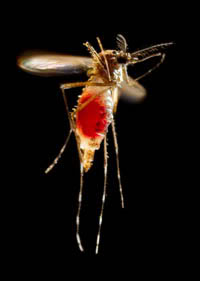With an average of 50 million cases worldwide dengue fever is second only to malaria in terms of concern for mosquito-borne illnesses. Carried primarily by the mosquito species Aedes aegypti, the fever is usually not fatal; however a particular strain of disease can be especially dangerous to children. However, early this year new research brings hope to the tropical areas where dengue fever is prevalent. Scientists have discovered a new possibility in debilitating the mosquitoes carrying dengue fever: the Wolbachia parasite.
 Aedes aegypti is the dengue fever carrier. Photo courtesy of CDC. |
Mosquitoes that are infected with the Wolbachia virus on average have their life-spans cut in half. Since the dengue virus takes a couple weeks to incubate in mosquitoes, researchers believe that a shortened lifespan should significantly reduce the possibility of the dengue virus in Aedes aegypti.
Transmitted by the maternal line, in test conditions the Wolbachia parasite passed to over 99 percent of the female’s progeny. Infecting mosquitoes with the parasite throughout outbreak regions could make dengue fever a rarity, though the researchers state that more research is needed before widespread application.







